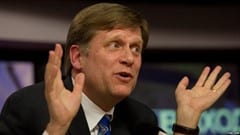Some ten years ago, as a financial strategist/fund manager in post-crisis Moscow, while laboring away over my strategy monthly “Truth and Beauty (and Russian Finance)” with its recurrent theme that Russia was embarking upon her New Asian Century (i.e. turning away from the West to build bridges to China), I was surprised to receive a polite rejoinder from one of my readers: the prominent Stanford academic Michael McFaul – even then seen as a rising star in Eastern European policy for the US Democrat Party.
The professorial McFaul gently admonished me that I was deeply misguided in my belief that the Russian Bear would embrace the Chinese Dragon. Quite the opposite, he intoned, “The Russians are so terrified of China that they will be forced to beg Washington for a military alliance – at whatever price the Pentagon sees fit to demand!”
The ensuing years have not been kind to that prediction. While we fund managers are judged upon our track records, and few careers would survive such a blunder, being a politician (or a journalist) means never having to say, “I’m sorry”.
A few years later, as US-Russian relations were becoming increasingly envenomed, McFaul was drafted in as ambassador to Moscow with a mission to salvage Obama’s desperately imperiled “Russia Reset.” A worse choice could hardly have been imagined.
Most countries have a corps of professional diplomats – graduates of specialized academies who begin their careers as first secretaries in relatively obscure embassies, learning their craft under an experienced senior diplomat before being considered for promotion to more prominent positions. US Embassies, on the other hand, most often go either to the highest bidder – the fund raisers bringing in the most money for the successful presidential candidate – or, just occasionally, to ideologues chosen as a sop to their political backers. The former tend to be harmless – the latter, far less so. McFaul was an ideologue with a mission to promote Washington hegemony under the guise of democracy support – and a rank amateur at diplomacy. He took up his position with an egregious breach of the most basic ambassadorial practice, holding high-profile public meetings with a rag-tag bunch of anti-Kremlin activists and self-styled dissidents – acceptable for a private citizen or a militant with an NGO, but unheard of for an ambassador. Imagine for a moment the reaction had the Russian ambassador to Washington begun his posting not with a courtesy visit to various cultural institutions, but with noisy meetings with Occupy Wall Street and 9/11 Conspiracy theorists.
It was downhill from there. By the end, the hapless McFaul was treated as persona non-grata in the Kremlin, boycotted by high-ranking Russian officials, and increasingly isolated in his embassy, where the State Department was obliged to short-circuit him out of any remaining negotiations between Washington and the Kremlin. Bored, lonely and frustrated, he compensated with further provocations – supporting such disparate causes as the porno-punk band Pussy Riot. Toward the end, even most anti-Kremlin activists tended to avoid being seen with him in public.
By the time the US State Department pulled him out in a belated damage-control exercise (as a courtesy he was allowed to resign, stating that he was giving up the ambassadorship which was to be the culmination of his career, “in order to be closer to [his] family in California”), his mission to Moscow was a shambles, even from the standpoint of his Washington backers. His clumsy showmanship had served only to undermine the Russian liberal forces he most wished to support, tainting them as being in the pay of a hostile foreign power, while contributing to the rise of exactly those factions in Russia most inimical to his own country.
Ultimately disowned even by those Russian liberals he purported to support, he shall now spend the balance of his career writing angry editorials impotently calling for still more NGOs and propaganda organs aimed at convincing the increasingly anti-American Russians to overthrow their own government and to embrace those Washington factions most closely associated with the catastrophic Yeltsin years – before he gradually slips into oblivion, a mediocre academic who enjoyed a brief dream of grandeur. He will not be missed.

